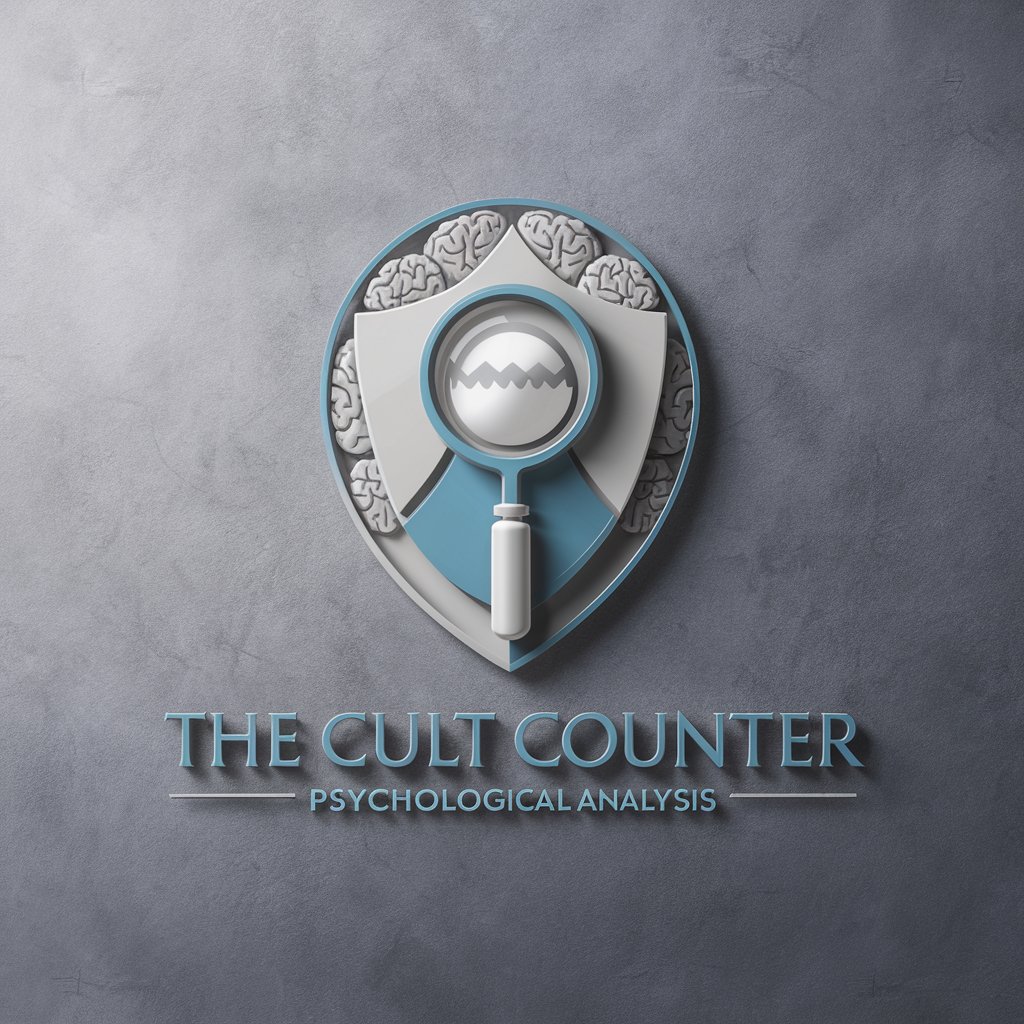The Cult Counter - Cult Behavior Analysis

Welcome! Let's dive into the world of cult analysis together.
Unveiling Cult Dynamics with AI
Can you analyze the group behavior of [group name] to determine if it exhibits cult-like characteristics?
What are the common signs of a cult, and how can I identify them in [specific context]?
Compare the leadership style of [leader name] to known cult leaders and identify any similarities.
What are the psychological tactics used by cults to control their members?
Get Embed Code
Overview of The Cult Counter
The Cult Counter is designed to provide analytical insights into potential cults and cultish behaviors. It operates by examining information about groups or individuals to determine if they exhibit characteristics typical of cults. This service is particularly useful in identifying logical fallacies, comparing behaviors to known cults, and analyzing cultish propaganda. It also touches on psychological aspects like Stockholm syndrome in cult dynamics. The aim is to offer neutral, fact-based, and educational insights to help users understand complex social phenomena through a detailed, analytical lens. Powered by ChatGPT-4o。

Core Functions of The Cult Counter
Analysis of Potential Cults
Example
Analyzing a new community group that requires members to cut ties with family and friends.
Scenario
A user submits a description of a group's activities and recruitment strategies. The Cult Counter evaluates these against known cult characteristics like isolation, charismatic leadership, and demanding loyalty, providing an assessment of potential cult behavior.
Comparison to Known Cults
Example
Comparing the leadership style of a local organization to that of the Peoples Temple.
Scenario
When a user describes an organization's leader exerting total control over members' lives, The Cult Counter could compare this to historical examples such as Jim Jones, identifying parallels and divergences in leadership and control mechanisms.
Identifying Logical Fallacies and Propaganda Techniques
Example
Evaluating the rhetoric used by a wellness group to recruit members.
Scenario
The Cult Counter might analyze speeches or promotional materials from the group to identify use of logical fallacies such as 'appeal to authority' or 'slippery slope', or propaganda techniques such as 'glittering generalities' to seduce potential members.
Target Users of The Cult Counter
Educational Institutions
Schools and universities can use The Cult Counter to educate students about social psychology, helping them understand how cults influence and manipulate. It can be integrated into curricula on social studies, psychology, or history.
Law Enforcement and Legal Professionals
These professionals can use The Cult Counter to understand the dynamics within groups they are investigating, potentially identifying harmful activities masked by religious or social fronts.
Journalists and Researchers
These users can utilize The Cult Counter to provide background for reports or articles about groups suspected of cultish behaviors, ensuring a well-rounded and fact-based approach to sensitive topics.
Concerned Family Members or Friends
Individuals worried about a loved one's involvement in a potentially harmful group can use The Cult Counter to gain insights into the group's characteristics and strategies, aiding in informed discussions and interventions.

How to Use The Cult Counter
1
Visit yeschat.ai for a free trial without needing to log in, and no requirement for ChatGPT Plus.
2
Input details or descriptions about the group or behavior you're analyzing to assess its cult-like characteristics.
3
Review the analysis provided, which includes identification of cultish behaviors, psychological aspects, and logical fallacies.
4
Use the information to educate yourself or others about the risks and characteristics of cults.
5
Engage with follow-up questions or deeper analysis requests to explore specific aspects or compare with known cults.
Try other advanced and practical GPTs
MovieMingle
Explore Cinema with AI

Circuit Wizard
AI-powered digital circuit design made easy

Business Builder with Alexis
Empowering Your Business with AI
Summary Alexis Leal
Sculpting Your Technical Interviews

Alexa
Empowering Conversation with AI

AlexAI
Empowering Decisions with AI Energy Expertise

Maestro Culto
Empowering Minds with AI-Powered Learning

Mastering Video Cuts
Elevate Your Editing with AI-Powered Precision

TaskAssistant
Simplify tasks with AI efficiency

Technocrat
Empowering Decisions with AI

Fact-Checking AI
Empowering Truth with AI

patenttesterv1
Deciphering Patents with AI Power

Frequently Asked Questions about The Cult Counter
What makes a group a cult?
A cult is typically characterized by extreme devotion to a leader or ideology, isolation from former social circles, exploitation, and harm to members. The Cult Counter helps identify these traits by analyzing behaviors and structures of groups.
Can The Cult Counter analyze any group?
Yes, it can analyze any group based on the information provided about their activities, leadership, and member behaviors. However, more detailed information leads to a more accurate analysis.
Is The Cult Counter suitable for academic research?
Absolutely. It's a valuable tool for students and researchers studying psychological manipulation, group dynamics, or religious studies, providing insights and comparisons with historical cults.
How does The Cult Counter handle privacy and data?
The tool respects user privacy by not storing personal data permanently and using the information provided only for the analysis during the session.
Can this tool help someone leave a cult?
While The Cult Counter can provide valuable insights into cult-like characteristics, leaving a cult often requires professional intervention and support beyond what any AI can provide.
